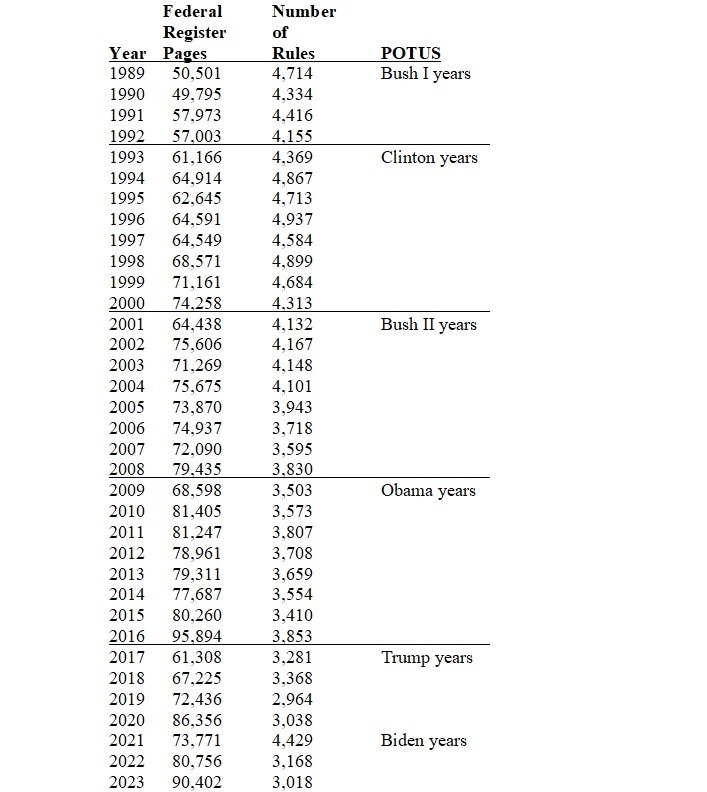Federal Register 2023 gives Congress 90,402 reasons to restrain the regulators

Photo Credit: Getty
As we bid farewell to 2023 and ring in 2024, the Federal Register reveals a noteworthy chapter in regulatory history under the Joe Biden administration.
Concluding at 90,402 pages, the Federal Register stands at the second-highest page count ever recorded, and marks a substantial leap from Biden’s own 79,856 pages recorded in 2022. Here’s a chart looking back at Federal Register page counts and rule counts dating back to the first George Bush.

Biden issued 3,018 final rules in 2023. While the sheer volume of regulations didn’t break records, the president’s approach diverges notably from predecessors. Rejecting regulatory liberalization as a priority (even Obama talked occasionally of streamlining), Biden champions “net benefit” pursuits through top-down, “whole-of-government” initiatives focusing on climate, equity, and other social and economic policies.
We have explored these in depth in recent months, and noted how the passage of legislation on inflation, infrastructure and technology over the past three years will enable progressive ambitions in a way that ought to alarm many policymakers.
The above historical breakdown of Federal Register pages should prompt some reflection. Trump’s “one-in, two-out” did shrink page and rule tallies initially, but paradoxically inflated page counts later in his term. This was so because of the perplexing need to write a rule to eliminate one thanks to the Administrative Procedure Act. COVID-19-related rulemaking in 2020 didn’t help Trump’s optics in this regard either.
Policymakers might be rewarded in 2024 by delving deeper into Biden’s growing record and looking for ways to offset an escalating regulatory agenda.
Notably, 290 of Biden’s 3,018 completed rules were deemed “significant,” while 780 of them were acknowledged to affect small businesses.
In addition, 324 of 2023’s 2,102 proposed rules in the pipeline, set to materialize in 2024 and beyond, are deemed “significant.” That is, the new year has yet to begin, and already 690 proposed rules, including 87 deemed “significant,” are openly in play that could affect small businesses.
Beyond what we can loosely count in the Federal Register, Biden’s executive activism includes a fondness for guidance documents and policy statements which are likely to increasingly shape the regulatory landscape in unpredictable ways.
Obviously, Federal Register pages and rule counts have grave limitations as precise gauges of regulatory sprawl. As we step into the New Year, we should anticipate, if not demand, calls for Congress to address transparency in a broader regulatory streamlining campaign, especially as small businesses and state and local governments feel the pinch.
If Congress does take charge, establishing a Congressional Office of Regulatory Analysis could enhance the eroded review function at the Office of Management and foster a more transparent and publicly accountable regulatory framework. But Congress should also stop passing hyper-regulatory legislation like the inflation and infrastructure laws.
Over-delegation to regulatory agencies matters. So too does disregard of enumerated powers. If only the Federal Register could capture that, too.